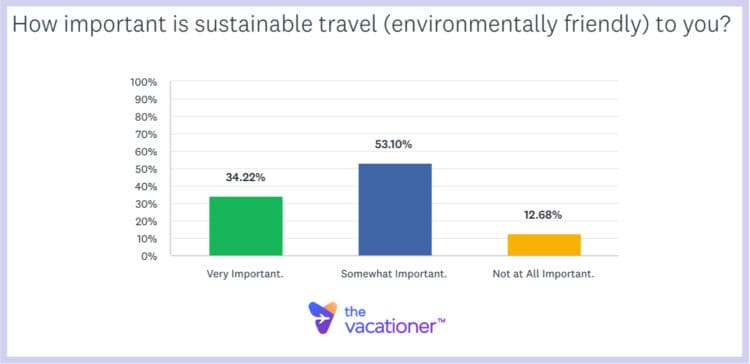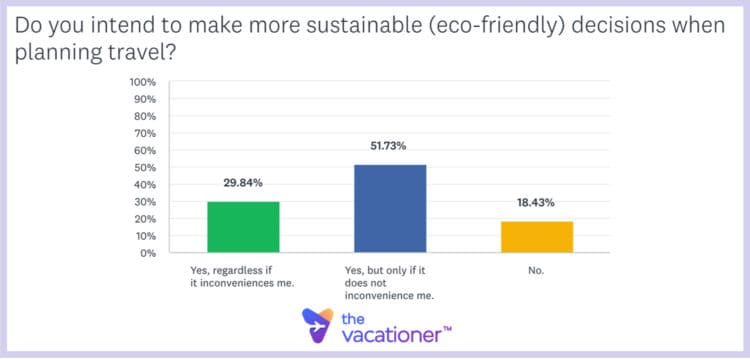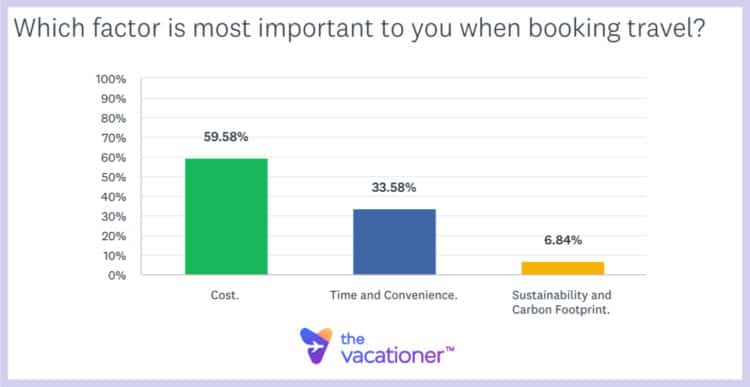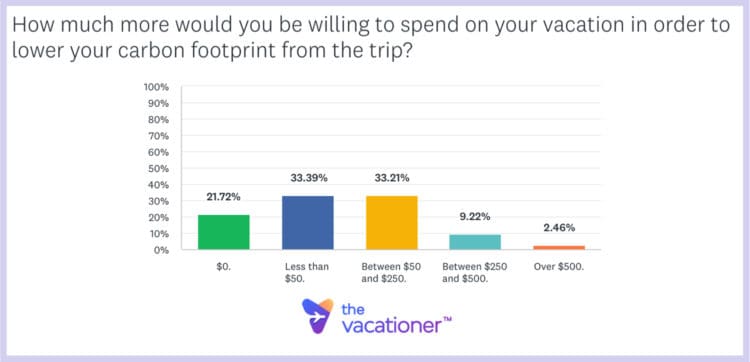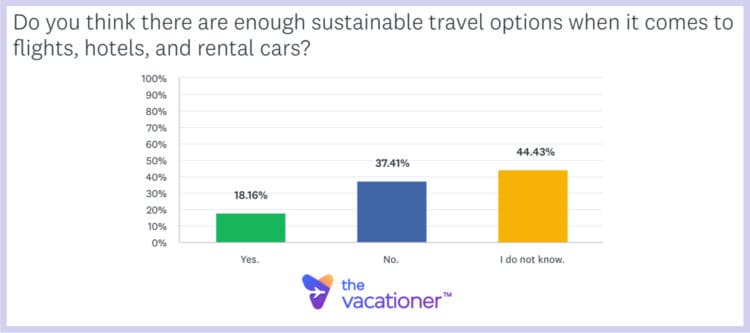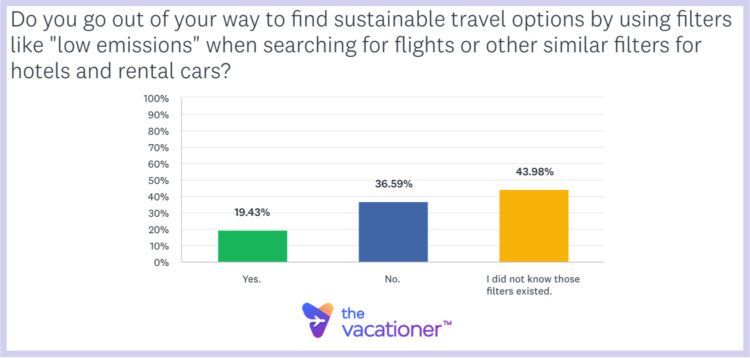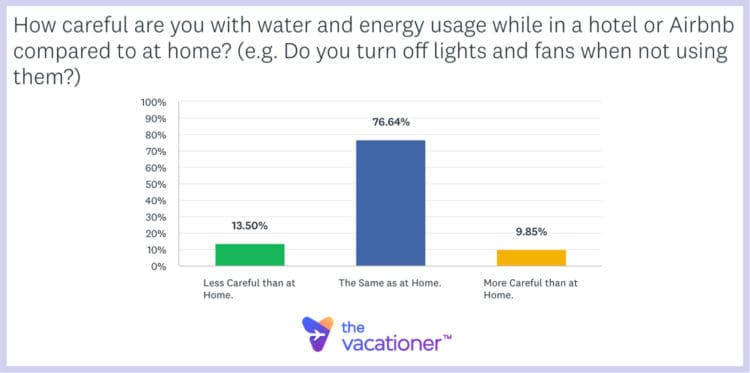Sustainable Travel Survey 2022 — 87% Say It’s Important, 82% to Make More Eco-Friendly Travel Decisions, 78% Pay More to Lower Carbon Footprint
Update – See our new 2023 Sustainable Travel Survey and compare the results to this article’s 2022 results.
We are now less than a month away from Earth Day 2022. Our Summer 2022 Travel Survey revealed 81% plan to travel this summer. And, nearly 51% intend to fly on a plane. 42% of American adults even say they will travel more than last year. With COVID restrictions fading and more people eager to vacation, we wanted to turn our focus back to sustainable travel.
Since Earth Day is around the corner, we conducted this 2022 Sustainable Travel Survey to gauge Americans’ sentiment to lowering their carbon footprint with travel. We wanted to know if more people are worried about sustainable vacation measures than when we conducted our 2021 survey. How important is sustainable travel to Americans? Would people be willing to spend more money to reduce their carbon footprint when they take a trip? How much thought do Americans put into sustainable travel? Please read below to find out answers to these questions and more.
Table of Contents
How important is sustainable travel (environmentally friendly) to you?
Let’s take a look at the survey results:
- Very Important. — 34.22%
- Somewhat Important. — 53.10%
- Not at All Important. — 12.68%
Interesting Demographic Comparison — American adults in the Middle Atlantic region are the most likely to say sustainable travel has at least some importance to them. 93.06% of people in this region said environmentally friendly travel is somewhat important or very important to them. The Middle Atlantic region contains the states of New York, New Jersey, and Pennsylvania.
Key Takeaway — More than 87% of American adults say sustainable travel is either Somewhat Important or Very Important to them. The 87.32% represents nearly 225 million people based on the current census. This is 4.65% more people than in our 2021 sustainable travel survey. 4.65% may not seem like a lot, but it represents nearly 12 million which is quite substantial. Many more people are becoming aware of sustainable travel methods and find it important to them. Additionally, 34.22% of people say sustainable travel is very important to them this year. Last year only 26.10% said it was very important to them which equates to a nearly 24% increase in people saying sustainable travel is very important.
The Vacationer Tip
Don’t forget to leverage your credit card to save money when buying sustainable travel for Earth Day. If you do not have a travel-rewards credit card, our highest recommendations are the Chase Sapphire Preferred® Card, the Capital One Venture X Rewards Credit Card, and the Citi Premier® Card. If you would like to see other offers, Click to See All of Our Recommended Travel Credit Cards.
Let’s take a look at the survey results:
- Yes, regardless if it inconveniences me. — 29.84%
- Yes, but only if it does not inconvenience me. — 51.73%
- No. — 18.43%
Interesting Demographic Comparison — The youngest generation of American adults aged 18-29 is most likely to make more sustainable decisions when planning travel. 92.31% of people in this age group said that. On the other hand, the oldest generation of American adults over 60 is the least likely to make more sustainable decisions when planning travel. Only 76.3% of those over 60 intend to do this.
Key Takeaway — Nearly 82% of American adults say they intend to make more eco-friendly decisions when planning travel. The 81.57% includes the 29.84% that says they will do it regardless if it inconveniences them. Also, it includes the 51.73% of American adults that say they will do it only if it does not inconvenience them. In total, the 81.57% represents 210 million people. It is also 6.72% or over 17 million more people than said they intend to make more sustainable travel choices last year.
Which factor is most important to you when booking travel?
- Cost. — 59.58%
- Time and Convenience. — 33.58%
- Sustainability and Carbon Footprint. — 6.84%
Interesting Demographic Comparison — Women are more likely than men to say cost is the most important factor when they book travel. 64.84% of women said cost was most important while only 53.82% of men did. On the other hand, men are more likely to say time and convenience are most important to them when booking travel. 39.14% of men said this while only 28.47% of women did. Men and women have a similar importance opinion on sustainability and carbon footprint.
Key Takeaway — Nearly 7% of American adults say sustainability and carbon footprint is the most important factor when booking travel. The 6.84% may seem like a small figure, but it still represents nearly 18 million people. Additionally, the 6.84% is a 36% increase from 2021 when only 4.38% of American adults said sustainability and carbon footprint was the most important factor.
Let’s take a look at the survey results:
- $0. — 21.72%
- Less than $50. — 33.39%
- Between $50 and $250. — 33.21%
- Between $250 and $500. — 9.22%
- Over $500. — 2.46%
Interesting Demographic Comparison — People in the Middle Atlantic region of New York, New Jersey, and Pennsylvania are most likely to say they will pay more for a vacation to lower their carbon footprint. 84.39% of people in the Middle Atlantic region said this. This shouldn’t be surprising as the Middle Atlantic region also was the one that was most likely to say sustainable travel was important to them. The East South Central region contains the Americans least likely to spend more money to reduce their carbon footprint when traveling. Only 72.06% of people in this region said they would. The East South Central region is made up of the states Kentucky, Tennessee, Alabama, and Mississippi.
Key Takeaway — Over 78% of American adults would pay more for a vacation to lower their carbon footprint. The 78.28% represents 202 million people. It also is more than the 71.37%, or 184 million people, that said they would pay more for a vacation last year. Additionally, 11.68% of American adults or 30 million people said they would spend $250 or more to lower their carbon footprint when traveling. Also, 2.46% or more than 6 million Americans said they would spend over $500! Earth day is going to be more important than ever as more and more people are prepared to fight climate change.
Do you think there are enough sustainable travel options when it comes to flights, hotels, and rental cars?
Let’s take a look at the survey results:
- Yes. — 18.16%
- No. — 37.41%
- I do not know. — 44.43%
Interesting Demographic Comparison — Women are less likely than men to think that there are enough sustainable travel options. Only 15.95% of women think there is enough while 20.55% of men think there are enough sustainable travel options for flights, hotels, and rental cars. Women are also more likely to say they simply do not know. 47.68% of women said they do not know while only 40.70% of men did.
Key Takeaway — More than 37% of people do not think there are enough sustainable travel options when it comes to flights, hotels, and rental cars. Another 44.43% of people do not know. This means 81.84% either think there are not enough sustainable travel options or simply do not know. The 81.84% represents 210 million people. This is a large portion of people thinking there are not enough sustainable options or not knowing if there is. As Earth Day approaches, it’s time for us as a society to continue to produce more sustainable options and to educate the public.
Let’s take a look at the survey results:
- Yes. — 19.43%
- No. — 36.59%
- I did not know those filters existed. — 43.98%
Interesting Demographic Comparison — The younger generations are more likely to go out of their way to find sustainable travel options. 23.08% of American adults aged 18-29 say they do this. And, 25.94% of American adults aged 30-44 say they do. On the other hand, only 18.02% of those aged 45-60 do. And, only 10.37% of American adults over age 60 say they go out of their way to find sustainable travel options.
Key Takeaway — Nearly 2 out of every 10 American adults say they go out of their way to find sustainable travel options. The 19.43% equates to 50 million people. 50 million people intentionally using filters to find sustainable travel options is a substantial amount. 43.98% of Americans also do not even know these filters exist. If the public were more educated about these filters and sustainable travel options, we would likely see a very large increase in people using them.
Let’s take a look at the survey results:
- Less Careful than at Home. — 13.50%
- The Same as at Home. — 76.64%
- More Careful than at Home. — 9.85%
Interesting Demographic Comparison — The youngest generation of American adults aged 18-29 are more likely to be less careful than at home with energy usage in a hotel or Airbnb. 18.55% of Americans in this age group said this which is much higher than the average. On the other hand, American adults over 60 are the least likely to be less careful than at home. This makes sense as the older generations tend to be much more respectful of others’ belongings.
Key Takeaway — 13.50% of American adults or 35 million people say they are less careful than at home when it comes to energy usage at a hotel or Airbnb. On the other hand, 9.85% or 25 million people say they are more careful than at home. It is upsetting to see that more Americans are less respectful of other peoples’ property and energy.
Survey Methodology
This 2022 Sustainable Travel Survey was conducted by SurveyMonkey on behalf of The Vacationer. In total, 1,096 Americans over the age of 18 were polled on March 1. Of those surveyed, 46.71% were male and 53.29% were female. The age breakdown of participants included in this survey was 20.20% in the range 18-29, 29.25% in the range 30-44, 25.87% in the range 45-60, and 24.68% over 60. This survey has a confidence level of 95% and a margin of error of ±3.026%. You can learn more about SurveyMonkey’s sampling method by clicking here.
The questions were chosen and the results were analyzed by the post author, Eric Jones, who is a Mathematics and Statistics Professor at Rowan College South Jersey.
Editorial Disclosure: Opinions expressed here are the author’s alone, not those of any bank, credit card issuer, hotel, airline, or other entity. This content has not been reviewed, approved, or otherwise endorsed by any of the entities included within the post.
Get The Vacationer Newsletter
Get highlights of the most important news delivered to your email inbox
See also

Summer Travel Survey 2022 — Nearly 81% to Travel, 42% to Travel More than Last Summer, Nearly 51% to Fly on a Plane, 80% to Road Trip

Russia-Ukraine Conflict Travel Survey — 40% to Reconsider 2022 Travel Plans, 36% of Americans Feel Less Safe Traveling Since Russia’s Invasion


